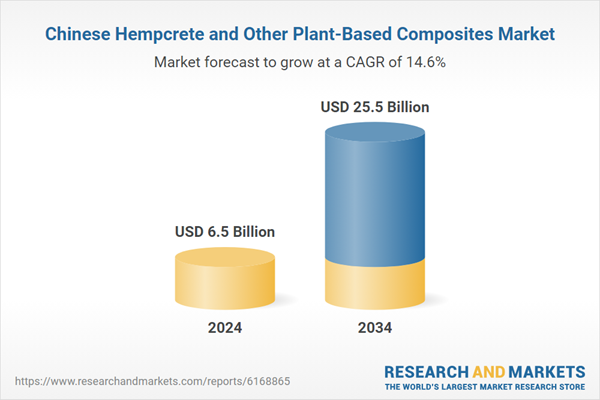Market Size & Growth:
- 2024 Market Size: USD 6.5 billion
- 2025 Market Size: USD 7.5 billion
- 2034 Forecast Market Size: USD 25.5 billion
- CAGR (2025-2034): 14.6%
Regional Insights:
- Largest Region: North China
- Fastest Growing Region: East China
- Key Growth Areas: Hebei, Beijing, Shandong, Jiangsu, Zhejiang
Key Drivers:
- State support for green building: China's plans for carbon neutrality are speeding up market demand for green, plant-based construction materials such as hempcrete.
- Acoustic and thermal insulation performance: Hempcrete's capacity for temperature control and sound insulation underpins its increasing application in domestic buildings.
- Biodegradable and harmless composition: Plant-based composites provide a healthier alternative to synthetic insulation materials, particularly in low-rise dwellings.
- Development of green buildings and eco-villages: Bio-based materials are being incorporated into new designs by architects and developers to comply with LEED and green building specifications.
Key Players:
The leading 7 players in the China hempcrete and other plant-based composites market - Hemp Investment Group (Hmi Group), Yunnan Academy of Agricultural Sciences, Zhejiang Hailun Rope and Net Co., Ltd., Huizhou Jiajia Craft Co., Ltd., Zhengzhou Wollen Instrument Equipment Co., Ltd., Isohemp, and Americhanvre together hold around 30.4% of the market share.Key Challenges:
- Lack of standardized regulations and testing: Limited recognition for building codes regarding hempcrete limits scalability in both the construction and manufacturing sectors.
- High processing costs: The prices of converting raw hemp into a usable building material are still cost-prohibitive.
- Contractor/market experience: Developers, builders, and contractors do not want to switch from their traditional materials because they do not know how to use hempcrete.
Browse key industry insights spread across 192 pages with 211 market data tables and figures from the report, along with the table of contents:
By Product Type - Hempcrete Products Lead
In 2024, the largest market share for hemp was not an unexpected result. Hempcrete panels and blocks were the largest product piece because they are used for infill walls, insulation, and in modulars. Being lightweight, they both fit within new construction and retrofits. They are easier to install than traditional materials.By Application - Construction Sector Drives Demand
Construction had the largest market share in 2024, as the demand for hempcrete walls, hempcrete floors, and hempcrete roofs grew. The perceived fireproof porous characteristics of hempcrete enable builders to comfortably adopt this material, as internal air quality and conservation of energy is guaranteed to comply with their internal specifications.By End Use - Residential Segment
Residential housing captured the highest market share in 2024. Particularly in low-rise, single-family housing and off-grid small dwellings. With an increasing interest because of sustainability and with consumers looking for non-toxin homes, hempcrete is becoming popular with environmentally friendly developers.By Raw Material - Hemp Material Stays Dominant
In 2024, hemp shiv and hemp fiber remained the dominant raw material inputs for the industry. With the existing farming base in China, Hemp is a low-input crop for composites, especially composites that are combinations of lime or clay binders.North China dominated the market in 2024, with green construction practices going mainstream, pilot eco-villages, and government subsidies encouraging renewable building materials. The region has access to extensive hemp production, robust research support, and growing recognition of low-emission housing solutions.
The leading companies in the hempcrete and plant-based composites market in China include Zhengzhou Wollen Instrument Equipment Co., Ltd., Zhejiang Hailun Rope and Net Co., Ltd., Huizhou Jiajia Craft Co., Ltd., Yunnan Academy of Agricultural Sciences, Hemp Investment Group (HMI Group), IsoHemp, Americhanvre, Hempitecture, Tradical Hemcrete, and HempFlax.
As a means to gain market share in China, these major players have been actively pursuing R&D partnerships, product localization, and supply chain vertical integration. Hemp Investment Group HMI has established, expanded, and increased domestic hemp processing plants, and Zhengzhou Wollen has been conducting composite innovation research projects with universities. Global companies such as HempFlax and Tradical Hemcrete are looking into local joint ventures and distribution agreements. Various regional stakeholders are now concentrating on prefabricated hempcrete panels and multi-family green eco-housing projects, consonant with China's affordable green housing initiative.
Comprehensive Market Analysis and Forecast
- Industry trends, key growth drivers, challenges, future opportunities, and regulatory landscape
- Competitive landscape with Porter’s Five Forces and PESTEL analysis
- Market size, segmentation, and regional forecasts
- In-depth company profiles, business strategies, financial insights, and SWOT analysis
This product will be delivered within 2-4 business days.
Table of Contents
Companies Mentioned
The key companies profiled in this China Hempcrete and Other Plant-Based Composites market report include:- Hemp Investment Group (HMI Group)
- Yunnan Academy of Agricultural Sciences
- Zhejiang Hailun Rope and Net Co., Ltd.
- Huizhou Jiajia Craft Co., Ltd.
- Zhengzhou Wollen Instrument Equipment Co., Ltd.
- IsoHemp
- Americhanvre
- Hempitecture
- Tradical Hemcrete
- HempFlax
Table Information
| Report Attribute | Details |
|---|---|
| No. of Pages | 192 |
| Published | August 2025 |
| Forecast Period | 2024 - 2034 |
| Estimated Market Value ( USD | $ 6.5 Billion |
| Forecasted Market Value ( USD | $ 25.5 Billion |
| Compound Annual Growth Rate | 14.6% |
| Regions Covered | China |
| No. of Companies Mentioned | 10 |









